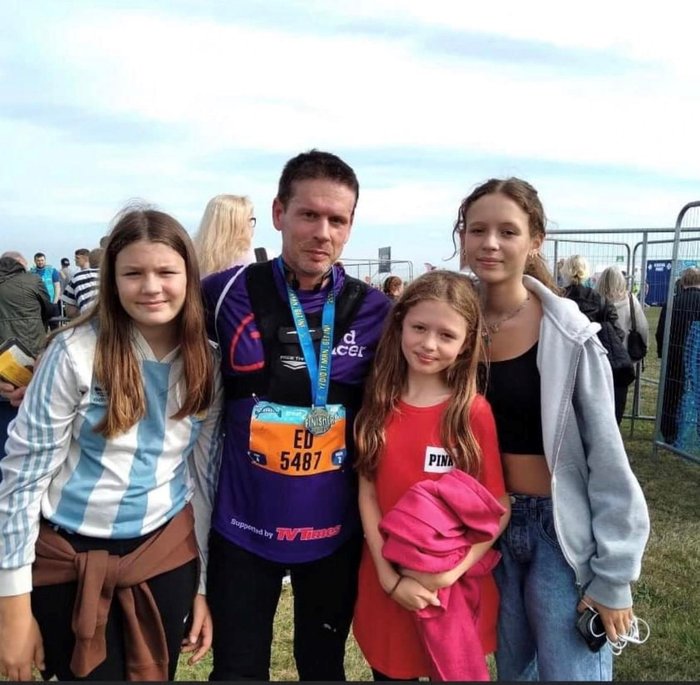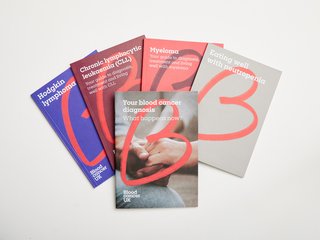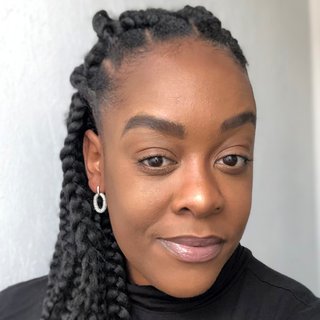Running to the rescue
Find out how long-distance running helped Ed through bereavement, a serious accident, and a blood cancer diagnosis.

For information see our web pages about ET or order our new ET booklet.
Throughout my childhood I played a lot of sport. I actually represented Yorkshire as a sprinter when I was a teenager, but I never felt comfortable running longer distances.
But I’ve ended up running marathons, despite some setbacks which might have stopped me, but actually gave me the motivation to carry on.
I get the running bug
Nine years ago, my mum died suddenly and two years later I lost my dad to prostate cancer. I was in a bad place and I started drinking heavily. It can’t have been easy for my wife Sarah and our three young daughters. But luckily I realised that I was heading for self-destruction, and that’s when I turned to running.
Like many people, I started with Park Runs – five-kilometre fun runs round a local park. The first one nearly killed me, but I got hooked.
I started to drink less and eat more healthy food, but at the time I never dreamed of running much further.
After a while, I started to place well in the Park Runs, and in 2019 I decided to try the Kew 10k. I remember thinking I had no idea if I could do it, but I amazed myself by running a really good time. I was really enjoying running but then in 2020, disaster hit.
I have a serious accident
I was on an early morning run on holiday in Lyme Regis. As usual, I had my headphones on and my running playlist on full blast. I stepped out in front of a car and was knocked down.
My right leg was broken in three places, my left shoulder and sections of my spine were fractured. I spent four weeks in hospital, and the doctors and nurses did an amazing job of patching me up. But one of the doctors said that I might never walk properly again.
For about a day I was depressed, but the very next day I woke up thinking, 'I’m going to run a marathon.'
I set myself the goal of being ready in a year and a half. I spent that time doing physiotherapy, Pilates, spinning and working out. I even joined a running club. I had always frowned on that kind of thing, but I felt I needed all the help I could get. I still run with them now – it has become an important part of my social life.
I find out I have ET
One month before my first marathon, more bad news. During my hospital check-ups after the accident, they spotted my platelet levels had risen rapidly and I was told I had essential thrombocythaemia (ET).
Essentially if Carlsberg did cancer it would be ET. Most people who have the disease live long and healthy lives. Yes, you have to be careful, because of the increased likelihood of blood clots. Some people are not so lucky and suffer strokes or heart attacks and in rare cases, it leads to leukaemia.
When the doctor at my local hospital broke the news, "You have a rare form of blood cancer," I broke down – not in a hysterical way, but I felt incredibly low. My father had lost his long battle with prostate cancer, which I have still never fully come to terms with and probably never will. Those words brought back very sad memories.
The doctor was incredibly kind and reassuring. She said in all likelihood I would be fine, but she warned me that my platelet count had rocketed since March 2021.
She said I needed to get my platelet level under control and that it would help to keep fit, eat well, never smoke, and reduce my stress levels.
That was that even more reason to run the marathon. I’m running for my life!

Order your free guide to ET
Includes understanding ET, treatments and how to look after yourself
I run my first marathon
I ran my first marathon in May 2022, and so did my wife Sarah. She had never run a marathon either but she said to her friend there was no way I could do one before her!
I trusted my training and went for it. Even after 20 miles when things started to feel more like a war zone, with people collapsing and stopping or pulling up, I kept going, thinking of that doctor and my mum and dad and putting the proverbial finger up to cancer.
In September last year, I also ran the Great North Run and raised over £3,500 for Blood Cancer UK, a charity now dear to my heart.
My family was there to watch, and it was a very emotional day for me. I found the race very tough, but I somehow got through it in a time of 1 hour 29.
Why I believe in setting goals
I think in many ways running has actually saved my life. It sounds dramatic but I really believe this to be true. It has had huge mental health benefits, and it’s helped me through some very dark periods. If I hadn't been out running when I was hit by the car, I wouldn’t have had the blood test and found out I had blood cancer. Funny how life works!
Of course, running is not for everyone. The important thing is to find something – anything – that challenges you and gives you a sense of achievement.
Everyone will find something that they enjoy, that motivates them and gives them a goal to strive for. But try to keep moving, as much as you are able. It’s good for your physical health and your mental wellbeing too.
I ran the Boston marathon in 2023, with a personal best of 3 hours and 4 minutes, qualifying me for the London marathon in 2024. Another goal reached!

